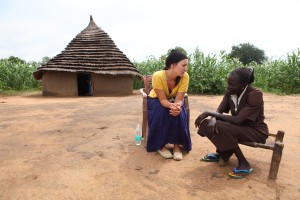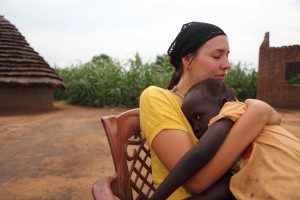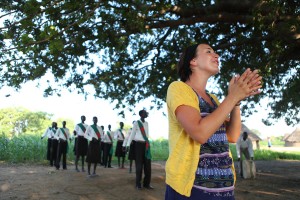Extreme Poverty
Staring poverty in the face

This is a guest blog post by singer, Jenny Simmons, who recently traveled to South Sudan with World Concern to see the great need in this country and witness the transformation taking place with the help of her supporters.
It is a simple memory—but one that haunts my mind.
The sound of rain coming for me.

Singer Jenny Simmons listens to one woman's story in South Sudan as she traveled with World Concern earlier this month.
Last week in Lietnhom, South Sudan, I slept under a tin roof (one of the only tin roofs in the village; everything else is thatched) during one of the biggest thunderstorms I have ever heard in my life. The rain sounded like an army. Constant, steady, violent, encroaching. Angry. All night long it pounded away at the roof like artillery fire.
It is odd to sit in my living room today and watch the soundless rain roll off my shingled roof.
Like most of South Sudan, there is no electricity in the village of Lietnhom. So when it is dark, it is very dark. And when bolts of lightning strike, they pierce the sky with an unbelievably cruel, taunting brightness.
It must be scary as a small child to live in a hut with a thatched roof and no electricity during a thunderstorm.
It is utter darkness. No sound of cars in the distance. No highways. No stadium lights or street lights or sirens. Can you even imagine that kind of darkness? That kind of silence?
I would be lying if I said I wasn’t scared.
I was.
In fact, the truth is, I was scared during much of my trip to South Sudan.
The people were kind beyond measure. They offered us the very best of every single thing they had. Their food. Their beds. Their friendship. Still, I found myself lying in bed each night praying several different prayers of desperation.
“Lord, please send a UN helicopter to come get me.”
“God, if you’re gonna end the world somehow, someway—tonight would be a perfect night for you to go ahead and do that.”
“God I will do anything—I will serve you anywhere—if you will please, please just deliver me from this place.”
It is with great shame that I confess: My solution, as I interacted with people living in extreme poverty, was to beg God to put an end to the world. Or at the very least, send in a special UN convoy to rescue me from latrines, mosquito nets, cold showers, no electricity and the really scary thunderstorm in the black of night that rattled the tin roof above my head like an army, coming to pillage.
Just because I spent a few days in the bush of South Sudan doesn’t make me a saint or a hero or even a humanitarian. I’m not. I straight up spent most of my time praying for the apocalypse just so I would not have to pee in another bush on the side of a dirt road. Is that really end-of-the-world worthy? I think not.
If you make any conclusion about me based on my trip to South Sudan, conclude this: I am scared and selfish.

Jenny embraces and prays for a child in South Sudan.
Scared to eat food that comes out of a tin shack with mud floors and barefoot women. Scared to eat the chicken on my plate (because I swear he was just roaming around my bedroom window a few minutes ago). Scared to use the latrines, convinced that the horrific smell has created some sort of critter that will come out and eat me. Scared to sleep in pitch black darkness. Scared to hold a baby that may not live to be a little girl. Scared to hug a momma who has to bury that little girl. Scared to look at both of them in the eyes and imagine it being me and my little girl. Scared to love them and see them as people … because what if I go home and forget about their stories? Forget their cries for help?
“No milk. No milk,” the momma shows me her breasts, drooping and empty, “You take her.” And she tries to hand me her four-month-old baby.
Scared to look her in the eyes—scared that seeing her as human means I must act.
Scared that the problem is too big to be solved.
Scared that the only solution is death.
At the end of the day, I was just scared.
And selfish.
Though the country was beautiful and the people I met were amazing… the truth is, I couldn’t get home fast enough. When I got to Washington, D.C. my dad picked me up from the airport. I asked if we could go straight to a restaurant for breakfast. I scarfed down croissants and muffins. A latte. In a pastry shop that serves the up and up of Washington, D.C. elites. From there I went straight to the store and bought a new outfit. A razor. Body scrub. Face wash. I showered for nearly an hour. An entire hour of wasted water and gas. And then, we went out to eat again for Mexican food. I ordered $10 table-side guacamole. By the time I caught my flight back to Nashville I had spent more money in half a day than the families I had just been with, spend in a year.
And the spending and eating and gluttony on all levels was cathartic. A sort of cleansing of the poverty via a frenzy of money spending. It was like something in me needed to spend money. Needed to consume. Needed to re-ground myself in wealth and comfort as quickly as possible.
And that speaks to my own selfishness. My own poverty.
An unhealthy dependence on the things of this world to make me feel comfortable and happy.
So now you know the truth. I am just a girl. Mostly scared. Mostly selfish. Entirely out of her element in the small village of Lietnhom, South Sudan. Praying, begging for some end-of-the-world moment, simply so I could be delivered from my own discomfort.

Joined by a village choir in South Sudan, singer Jenny Simmons sings "Amazing Grace" during a small concert in the village of Lietnhom.
Poverty does that to us. It makes us uncomfortable. And if we can just get to the center lane, so we don’t have to pull up right next to the homeless person on the corner and look them in the eyes, we have saved ourselves the discomfort of having to know and having to act.
The truth is, my trip to South Sudan with World Concern was one of the hardest trips of my entire life. And I feel like a baby saying that because my teammates joyously snapped pictures, conducted interviews, pooped in latrines without complaint and ate the poor little pet chickens without hesitation. But for me, it was hard. It was hard on my body and soul. It was an affront to every single way of life I have ever known.
South Sudan was hard for me.
We are all a little scared to stare poverty in the face. And we should be.
Poverty displays the very essence of our brokenness as people. Those living in it and the rest of us … avoiding it. We both operate out of poverty.
Jesus came to alleviate poverty. He didn’t avoid it. In fact, in the New Testament, many times Jesus went out of his way—literally, through different villages and cities in order to stare the broken, hurting, poor, widowed, ostracized people in the eyes. He looked poverty in the face, in order to give hope. Other times, he went out of his way to teach those with wealth what it truly looked like to follow him. To give away possessions, and more importantly, to be willing to follow His lead even when it meant personal comfort would be diminished. He knew that people were either impoverished in their spirit or in their possessions. A lack of faith or a lack of bread were the same in His eyes—and he sought to shine new life into both kinds of people.
We go where God sends us. To the least of these. And the truth is: we’re mostly too scared and too selfish to do this on our own. But God walks us through our greatest fears.
So at the end of the day, I do not stand here a proud girl, telling you of all the amazing things I did to serve the poor.
I stand here as a girl who prayed for a UN helicopter to come rescue me. And instead, found a Savior who gave me strength, comfort and overflowing power and love to stare poverty in the face and at the end of the day—to sleep through the storm.
Be a part of ending poverty. Join me in seeing One Village Transformed.